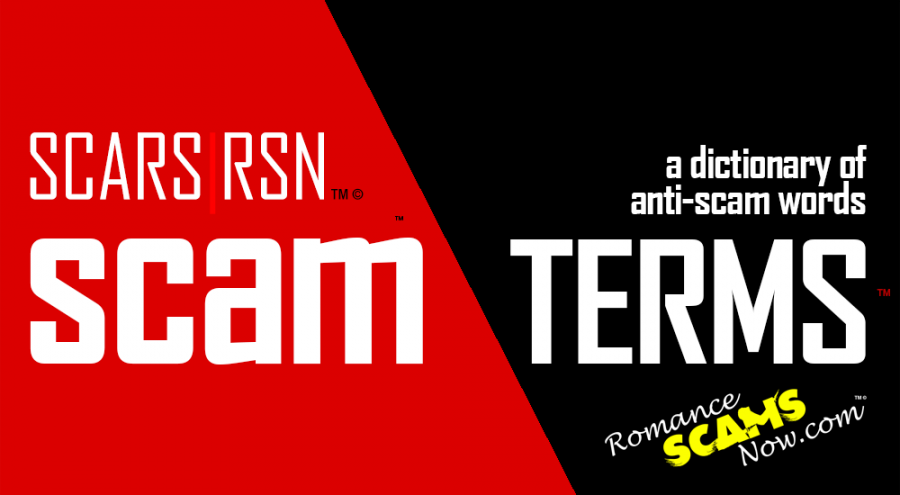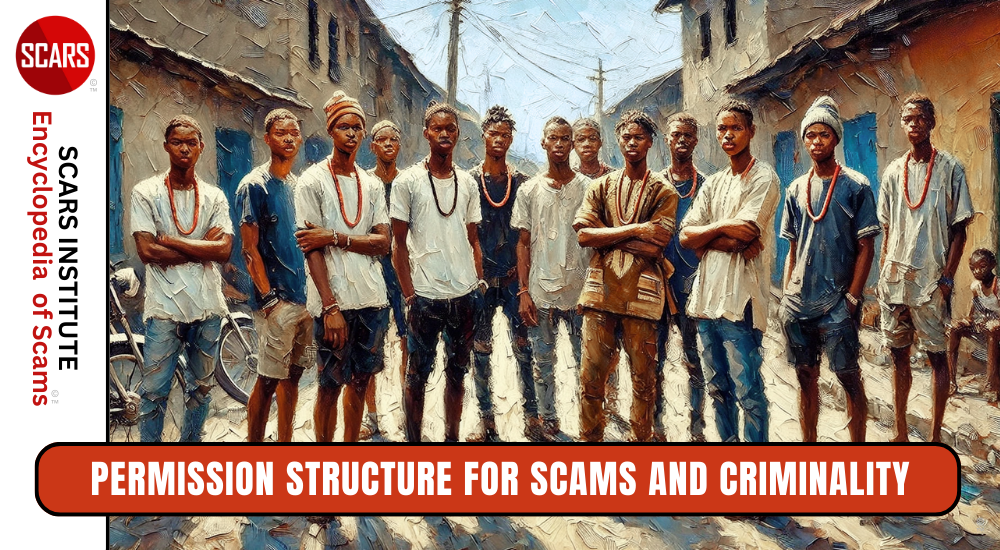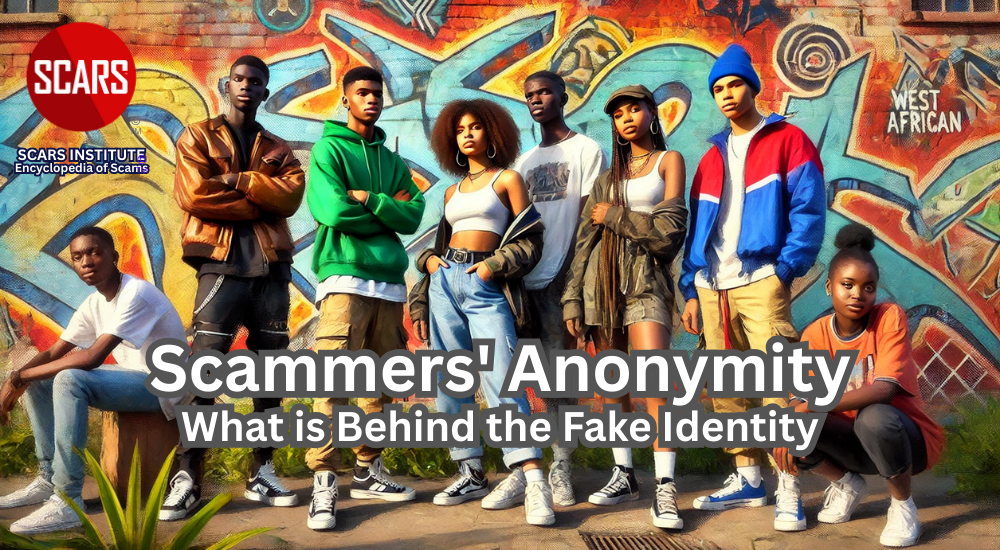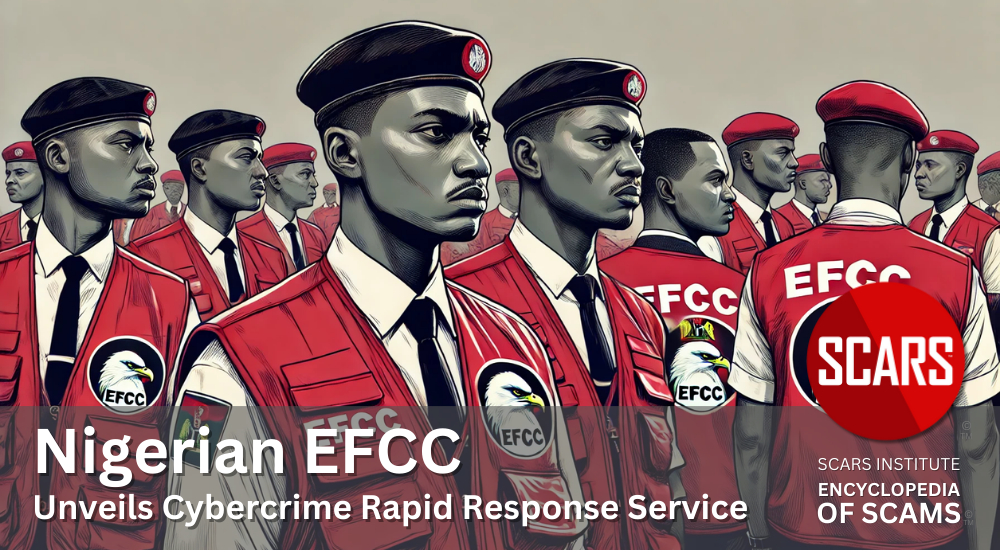
SCARS Institute’s Encyclopedia of Scams™ Published Continuously for 25 Years

RSN™ Guide: Real Scammers
How Can You Judge If A Real Person In Africa Is A Scammer?
When you see a real person’s profile, who is from Africa, how can you tell they are a scammer?
Will they have “Scammer” written across their forehead?
Sometimes It Is Easy
You see photos of their loot (money) and see posts they have written about scamming. They claim they are “Yahoo” or “Sakawa,” or are even part of a gang.
Sometimes Not
It requires more investigation or collateral proof.
The Types Of Scammers
What is a Professional (Cartel) Scammer?
- A professional scammer works for a larger organization, not a gang
- They speak better and write better – proper spelling and grammar
- They are better trained and more experienced at manipulation
- They understand the language and terms of the business or military they are claiming to be in
- They have a more complete or comprehensive profile
- They will rarely talk on the phone, and never on video chat
- These base their scam on business opportunities where they can gain far more money
- They mostly target people of means with larger rewards
- Work in seamless, well-coordinated teams
- Tend to work long cons – scams that can last years
What is a Gang Scammer?
- They work in a smaller gang of scammers
- Their language and grammar are poor
- They use shortcuts to avoid making mistakes – never or rarely use the victim’s name
- Rarely get on the phone
- Use recorded videos on video chat – the microphone is always broken
- Are sloppy in the setup of their profiles – errors
- The content of profiles is random and poorly thought out
- They have little time to spend with individual victims – churn victims that will not pay quickly
- Work in poorly coordinated teams
- Tend to work in shorter cons – lasting weeks or a few months – get in and out
What are Individual Scammers?
There are two types of Individual Scammers:
- Real People
- Rogue Scammers
Real People Scammers
- In many countries Real People Scam. You find this is Asia and Latin America mostly, but in Africa too. These are real people that develop a relationship with the victim, and everything about them is real, except for one crucial detail: they are married or have a significant other (boyfriend or girlfriend).
- They are scamming to make a living, take care of their families, or just enjoy life. They will be completely real, except about their feelings for the victims. They may like, may even feel love for the victim, but they have no intention of leaving their connection at home. It is just a scam.
- These are also the dominant type of Russian and Ukrainian scammers, except that they do work for companies that organize and promote these. Whereas typically in Asia and Latin America these are truly just individuals.
- These are not to be confused with real local Con Artists in your own country.
Rogue Scammers
- These are individual scammers who are using fake or real identities but working completely on their own. They are mostly using fake stories about themselves.
- In many cases, they were fired by an organization or left a gang. In some cases, they even left their own country to flee the risks of the group they were a part of.
- Rogue and small gang scammers are the ones that typically get arrested too, since they lack the protection that larger groups have that buy safety from the local police.
How To Detect Is A Real Person Is Scamming?
The most reliable way if simply if they ask for money.
The problem is how do you tell the difference between a real person in need and person scamming you?
If you think you know the true identity of a real person that you consider that you are in a relationship with, and they are now asking you for money, we recommend the following steps:
- Have video calls with them and their family and ask critical qualifying questions and watch the reactions of the people in their family – especially children if you are able to talk to them.
- Get real photos of them in their real lives – work, family, etc.
- Ask them for their real identification documents – have them take a photo using their phone – they should be able to send it within a few short minutes of your request – this at least should give you their real identity and it should match the online profiles you see.
- Hire a local investigator to determine the relationship status of the person. This should not cost more than a couple of hundred Dollars or Euros for most of these countries. You can get the contact information for your country’s embassy in their country, as ask them for help locating a private investigator – the Commercial Attaches should have local business directories at hand – or you can simply use the internet to look for local investigators.
- Use the VISA Process. Another means to verify a real person is have them go through the application process for a Visa to your country. You should be able to obtain the form for them online. Have them fill it in and ask them to take photos so you can review it beforehand. A scammer in unlikely to go through this with false information.
There is another problem with all of this though. None of this protects you against Marriage Fraud – someone who if completely clean, will come to your country and even marry you – then leave and divorce as soon as their permanent residency if granted. Unfortunately, this happens frequently.
Back To The Real Scammer
Almost all Real Scammers when you find their profiles have some clue that they are “In The Game.”
Always remember this one rule about scammers: They Are Sloppy! Not lazy, just sloppy – they work too fast – it takes a huge amount of time to scam hundreds of victims at once and they cannot take the time to be meticulous! This works in your favor since they leave traces behind.
Here are the things to look for:
RESURFACING: Many times, a scammer will create a fake profile to use to scam someone, then change the identity – sometimes to a new fake identity and sometimes to themselves (especially when they get a name challenge from Facebook – they will have to change it to their real name). This is also how they disappear sometimes, they change the name and the URL – poof they are gone!
When they do this, they are likely to overlook old elements from a previous identity. Looking carefully for anything odd or out of place is a clue that the profile was resurfaced.
- Look for the gender on the profile
- Look in the photos for someone that is out of place
- Look in the posts for things out of place
- Look in their likes and groups for things someone from their country would not realistically be interested in
- Look at the profile URL to see if there is a different name
- Look for any information in the section about them that is odd or out of place
CONNECTIONS: Look at their friends and connections, including post comments. A normal person will have real friends and a large assortment of people commenting on their profiles. A scammer will tend to have this polarized – meaning that they have some normal friends but may have a large number of foreign friends all of a type – such as women or men of a certain age. This is an indication they are fishing for victims. If there are a number of similar people that are not from his/her country then this is a major red flag.
INTERESTS: If the person has interests that are not of a type, but seem to be more aligned with the people they are connecting with this can be an indicator of scammer grooming. For example: a man would have likes for cars and football, but would probably not have a lot of likes for subjects relating to romance or woman’s topics, and vice versa. Always look for the things that are odd or out of place.
WHAT IS MISSING: One of the things about a scammer – real or fake – tends to be things that are missing from a profile. Real people have messy lives, but proportional lives. Meaning they have their interests and things they do and their profile tends to have a consistent stream to related things. It can have random ones too, but even those fall into patterns. Be suspicious of people that seem to have large gaps in both information and their activities based upon what you know of them. For example: they have a family, yet never seem to have any posts about their family or real events in their life.
BINGING: Binging or burst posting is always a red flag. It is when a person comes back around to the profile and then adds a ton of new posts all at once. Real people are also not always online and may sporadically post, but it tends to be one or two posts at random times. Binging tends to be 4 to 10 posts all at once with nothing really urgent or essential or relevant in them for the person, such as junk motivational posts that look like they are trying to convince someone there are romantic or sensitive.
The Challenge
The challenge in spotting real scammers is that it requires experience. After you have seen a few thousand real scammer profiles you can spot them most of the time. If you do not have the experience you have to rely on rules to govern and limit your risk.
The most important rule is: Do Not Friend or Talk To Strangers That Contact You! Ever!
If you follow that rule you will not fall for a Romance Scam!

RSN™ Team
a division of SCARS™
Miami Florida U.S.A.
END
WESTERN UNION REPAYMENT PROGRAM NEWS
FOR THE LATEST INFORMATION ABOUT THE WESTERN UNION REPAYMENT / REMISSION PROGRAM CLICK HERE – IT IS STILL OPEN FOR A PETITIONS FOR REPAYMENT
– – –
Tell us about your experiences with Romance Scammers in our Scams Discussion Forum on Facebook »
FAQ: How Do You Properly Report Scammers?
It is essential that law enforcement knows about scams & scammers, even though there is nothing (in most cases) that they can do.
Always report scams involving money lost or where you received money to:
- Local Police – ask them to take an “informational” police report – say you need it for your insurance
- Your National Police or FBI (www.IC3.gov)
- The Scars Worldwide Reporting Network HERE or on www.Anyscam.com
This helps your government understand the problem, and allows law enforcement to add scammers on watch lists worldwide.
Visit our NEW Main SCARS™ News & Information Facebook page for much more information about scams and online crime: www.facebook.com/SCARS.News.And.Information
To learn more about SCARS visit www.AgainstScams.org
Please be sure to report all scammers HERE or on www.Anyscam.com
All original content is Copyright © 1991 – 2018 SCARS All Rights Reserved Worldwide & Webwide – RSN/Romance Scams Now & SCARS/Society of Citizens Against Romance Scams are all trademarks of Society of Citizens Against Romance Scams Inc.
-/ 30 /-
What do you think about this?
Please share your thoughts in a comment below!
Table of Contents
- How Can You Judge If A Real Person In Africa Is A Scammer?
- Sometimes It Is Easy
- Sometimes Not
- The Types Of Scammers
- How To Detect Is A Real Person Is Scamming?
- Back To The Real Scammer
- The Challenge
- WESTERN UNION REPAYMENT PROGRAM NEWS
- Tell us about your experiences with Romance Scammers in our Scams Discussion Forum on Facebook »
- Please be sure to report all scammers HERE or on www.Anyscam.com
LEAVE A COMMENT?
Recent Comments
On Other Articles
- Arwyn Lautenschlager on Love Bombing And How Romance Scam Victims Are Forced To Feel: “I was love bombed to the point that I would do just about anything for the scammer(s). I was told…” Feb 11, 14:24
- on Dani Daniels (Kira Lee Orsag): Another Scammer’s Favorite: “You provide a valuable service! I wish more people knew about it!” Feb 10, 15:05
- on Danielle Delaunay/Danielle Genevieve – Stolen Identity/Stolen Photos – Impersonation Victim UPDATED 2024: “We highly recommend that you simply turn away form the scam and scammers, and focus on the development of a…” Feb 4, 19:47
- on The Art Of Deception: The Fundamental Principals Of Successful Deceptions – 2024: “I experienced many of the deceptive tactics that romance scammers use. I was told various stories of hardship and why…” Feb 4, 15:27
- on Danielle Delaunay/Danielle Genevieve – Stolen Identity/Stolen Photos – Impersonation Victim UPDATED 2024: “Yes, I’m in that exact situation also. “Danielle” has seriously scammed me for 3 years now. “She” (he) doesn’t know…” Feb 4, 14:58
- on An Essay on Justice and Money Recovery – 2026: “you are so right I accidentally clicked on online justice I signed an agreement for 12k upfront but cd only…” Feb 3, 08:16
- on The SCARS Institute Top 50 Celebrity Impersonation Scams – 2025: “Quora has had visits from scammers pretending to be Keanu Reeves and Paul McCartney in 2025 and 2026.” Jan 27, 17:45
- on Scam Victims Should Limit Their Exposure To Scam News & Scammer Photos: “I used to look at scammers photos all the time; however, I don’t feel the need to do it anymore.…” Jan 26, 23:19
- on After A Scam, No One Can Tell You How You Will React: “This article was very informative, my scams happened 5 years ago; however, l do remember several of those emotions and/or…” Jan 23, 17:17
- on Situational Awareness and How Trauma Makes Scam Victims Less Safe – 2024: “I need to be more observant and I am practicing situational awareness. I’m saving this article to remind me of…” Jan 21, 22:55
ARTICLE META
Important Information for New Scam Victims
- Please visit www.ScamVictimsSupport.org – a SCARS Website for New Scam Victims & Sextortion Victims
- Enroll in FREE SCARS Scam Survivor’s School now at www.SCARSeducation.org
- Please visit www.ScamPsychology.org – to more fully understand the psychological concepts involved in scams and scam victim recovery
If you are looking for local trauma counselors please visit counseling.AgainstScams.org or join SCARS for our counseling/therapy benefit: membership.AgainstScams.org
If you need to speak with someone now, you can dial 988 or find phone numbers for crisis hotlines all around the world here: www.opencounseling.com/suicide-hotlines
A Note About Labeling!
We often use the term ‘scam victim’ in our articles, but this is a convenience to help those searching for information in search engines like Google. It is just a convenience and has no deeper meaning. If you have come through such an experience, YOU are a Survivor! It was not your fault. You are not alone! Axios!
A Question of Trust
At the SCARS Institute, we invite you to do your own research on the topics we speak about and publish, Our team investigates the subject being discussed, especially when it comes to understanding the scam victims-survivors experience. You can do Google searches but in many cases, you will have to wade through scientific papers and studies. However, remember that biases and perspectives matter and influence the outcome. Regardless, we encourage you to explore these topics as thoroughly as you can for your own awareness.
Statement About Victim Blaming
SCARS Institute articles examine different aspects of the scam victim experience, as well as those who may have been secondary victims. This work focuses on understanding victimization through the science of victimology, including common psychological and behavioral responses. The purpose is to help victims and survivors understand why these crimes occurred, reduce shame and self-blame, strengthen recovery programs and victim opportunities, and lower the risk of future victimization.
At times, these discussions may sound uncomfortable, overwhelming, or may be mistaken for blame. They are not. Scam victims are never blamed. Our goal is to explain the mechanisms of deception and the human responses that scammers exploit, and the processes that occur after the scam ends, so victims can better understand what happened to them and why it felt convincing at the time, and what the path looks like going forward.
Articles that address the psychology, neurology, physiology, and other characteristics of scams and the victim experience recognize that all people share cognitive and emotional traits that can be manipulated under the right conditions. These characteristics are not flaws. They are normal human functions that criminals deliberately exploit. Victims typically have little awareness of these mechanisms while a scam is unfolding and a very limited ability to control them. Awareness often comes only after the harm has occurred.
By explaining these processes, these articles help victims make sense of their experiences, understand common post-scam reactions, and identify ways to protect themselves moving forward. This knowledge supports recovery by replacing confusion and self-blame with clarity, context, and self-compassion.
Additional educational material on these topics is available at ScamPsychology.org – ScamsNOW.com and other SCARS Institute websites.
Psychology Disclaimer:
All articles about psychology and the human brain on this website are for information & education only
The information provided in this article is intended for educational and self-help purposes only and should not be construed as a substitute for professional therapy or counseling.
While any self-help techniques outlined herein may be beneficial for scam victims seeking to recover from their experience and move towards recovery, it is important to consult with a qualified mental health professional before initiating any course of action. Each individual’s experience and needs are unique, and what works for one person may not be suitable for another.
Additionally, any approach may not be appropriate for individuals with certain pre-existing mental health conditions or trauma histories. It is advisable to seek guidance from a licensed therapist or counselor who can provide personalized support, guidance, and treatment tailored to your specific needs.
If you are experiencing significant distress or emotional difficulties related to a scam or other traumatic event, please consult your doctor or mental health provider for appropriate care and support.
Also read our SCARS Institute Statement about Professional Care for Scam Victims – click here to go to our ScamsNOW.com website.






















Thank you for your comment. You may receive an email to follow up. We never share your data with marketers.